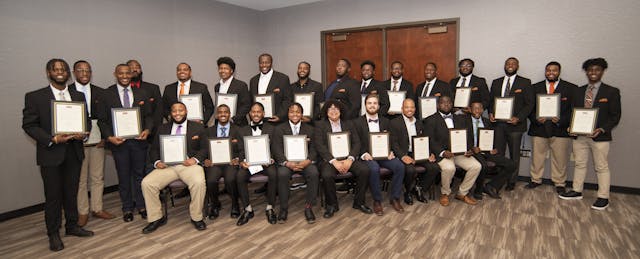When Alphonso Richard Jr. walked into his first teacher education course at Clemson University, he experienced a shock.
“Being in a class where you’re the only male, I didn’t know where to sit,” he says. “Girls were looking like, ‘Oh my goodness, is that a guy in here?’”
Compounding the confusion: Most women in the room were white, and Richard is Black. The dissonance was enough to send a shiver of doubt through the aspiring educator’s mind.
“It was a scared, hesitant feeling at first,” Richard says. “Am I meant to be here? Is this for me?”
It takes courage to enter a space where you’re not sure you belong. That’s the kind of threshold that Black men training to become educators have to cross many times. They make up only 2 percent of U.S. public school teachers (men overall compose 24 percent). They’re also underrepresented in college teacher-preparation programs, as education is “one of the least diverse major fields in higher education,” according to a 2019 report from the American Association of Colleges for Teacher Education.
Yet Richard didn’t have to overcome his uncertainty alone. Outside of class, he belonged to a brotherhood of fellow teachers-in-training, all of them members of a longstanding leadership development program known as Call Me MISTER.
“It felt like a safe haven sometimes,” says Richard, a recent graduate of the program and a new fifth grade teacher. “It’s guys going after the same mission—same vision—as you.”
When the initiative started two decades ago, people “really didn't believe that we would be successful at being able to attract a 17- or 18-year-old Black male to become a second or third grade teacher,” says Roy Jones, a provost-distinguished professor at Clemson and the executive director of Call Me MISTER.
And yet, the program has graduated about 300 African American men from college education departments in South Carolina, more than doubling the number of Black men teaching in elementary and middle schools in the state.
“Just like developing a student athlete—with just a fraction of the incentives and support—we believe that we can produce master teachers for our system,” Jones says. “And we've proven that over and over again.”

Photo by Patrick Wright, Clemson University, Photographic Services-University Relations.
Where Did All the Black Male Teachers Go?
Twenty-one years ago, when Jones looked at South Carolina’s school statistics, he found them sobering. Although 40 percent of students were African American, just 1 percent of their teachers were African American men. In the state’s 600 elementary schools, there were fewer than 200 Black men teaching.
“So a vast majority of the elementary schools in South Carolina did not have a single Black male teacher,” Jones says.
The figure contrasted sharply, he adds, with the fact that “65 percent of our incarcerated population were Black and brown men.”
Yet Black men weren’t always rare to see at the front of the classroom. In the early 20th century, historically Black colleges trained many students to work as teachers and preachers, Jones says, since those were two professions open at the time to African Americans. Some Black teachers also studied at universities in Northern states. The segregated schools where Black educators worked were starved of funding—yet researchers say those institutions also honored their expertise and valued African American culture, history and identity.
Starting in 1954, all that changed. By mandating school desegregation, Brown v. Board aimed to alleviate racial inequality in education. But the Supreme Court ruling also led many Black educators to lose their jobs, since white leaders preferred to hire white teachers and principals for newly integrated schools.
Other social shifts also lured—or pushed—Black men away from the classroom. As more career options opened for them, fewer chose to enter teaching, Jones says. Today, he adds, low educator pay does little to entice them to the profession.
“Probably the most disappointing is how K-12 schools and education is being perceived, in terms of what is going on in them,” Jones says. “You actually have teachers not necessarily even encouraging their own children to pursue being a teacher, as they may have once done.”
In the late 1990s, Jones encountered these perceptions regularly in his work as director of employment for the Charleston County School District, then as a dean and education professor at Claflin University.
He felt an “unapologetic commitment” to get Black men back in the classroom in South Carolina, but didn’t see higher education doing much to make that happen.
“We felt that nobody was coming to rescue and save us,” Jones says. “We were going to have to figure it out ourselves.”
‘The Best You Possible’
In the 1967 movie “In The Heat of the Night,” there’s a scene where a Black detective and a white sheriff disagree about the details of a criminal case. The sheriff pokes fun at detective Virgil Tibbs’ first name and mockingly asks what he’s called back home.
With a steely look, the detective replies, “They call me Mr. Tibbs.”
That line inspired the program Jones dreamed up—Call Me MISTER. The name alludes to the Jim Crow-era practice, common among white Southerners, of denying Black men the dignity of their surnames. It’s a reminder, Jones says, of the respect that Black men deserve, especially those who teach.
With that respect as a founding principle, Call Me MISTER launched in 2000 at Clemson and three private South Carolina HBCUs: Claflin, Benedict and Morris. Its goal: find talented young Black men, train them as teachers, and offer them jobs in the state’s schools. Its strategy: elevate the image of what it means to be an educator, in part by conveying the vital role teachers can play in their families and communities.
“Education and teaching is connected to everything everyone does,” Jones says. “If you want to be responsible to the next generation of people going to serve our nation, be a teacher.”
The program is a co-curricular complement to teacher education courses. Student participants—known as “Misters”—meet weekly with mentors. As Misters progress through the program, they learn to offer mentorship themselves, in preparation for the coaching that Jones says they’ll be called on to do in their careers as teachers.
They also learn that their own lives—no matter how difficult at times—can serve as powerful examples to the students who will one day look to them as role models.
“You've got to learn how to tell that story, because you're going to be in front of a kid in your classroom with that same story,” Jones says. “How can you not grapple with and understand your own story, if you expect to help that kid, who's coming to you wet-nosed and hungry that day and acting out because they’re mad and angry and they're disrupting your class? So if you don't understand where that kid is coming from and how to manage it, then you're going to lose them. And you can't rely on the next guy to take care of them.”
Several factors appeal to the young men who participate in Call Me MISTER. They receive college tuition assistance in exchange for their commitment to spend at least four years working in South Carolina public schools. And because the program uses a cohort model, students arrive at college with a built-in network of support. Undergraduate Misters live together in the same dorm, where they elect their own leaders, help each other study, and share the fun and stress of college life.
“We crack jokes, cook for each other, everything just building that bond,” Richard says. “It’s good times, a lot of laughs, a lot of memories made.”
Richard was a Mister while earning both his bachelor’s and master’s in education. He was drawn to the program in part by stories of the influence its graduates have had in the field. He also appreciated its focus on individual growth, which aims, he says, to “make you a better brother’s keeper, a better servant leader, a better person.”
“To be the best teacher, you have to be the best you possible,” Richard says. “Academically, they helped me out. But those life lessons, those are priceless.”
Changing the Equation
At Riverside Middle School near Greenville, South Carolina, there is one Black male teacher. A seven-year veteran of the profession, Kerry Highsmith serves as chair of the math department, stays after school to keep working with students, and mediates between teachers and the administration when necessary.
Before all that, he was a Mister.
“I don’t think I’d be down here teaching if it wasn’t for this program,” Highsmith says.
Highsmith’s grandparents were educators, but when the Maryland native attended college in Pittsburgh, he studied business, then economics. The tough job market he found when he graduated made him reconsider his mother’s suggestion that he pursue teaching. She’s the one who told him that Clemson had an education master’s program that might interest him.
Still, Highsmith wasn’t convinced right away.
“I was afraid to move to South Carolina,” he says. “I did not know what to expect. I didn’t know what type of community or school environment I was going to be in.”
But after Highsmith interviewed with Call Me MISTER, he decided to give the program a try. The tuition support was a big motivator, he says. So was the prospect of a graduate sequence that would point him directly to a stable career.
And the message that Highsmith says he heard from the program resonated with him, too: “We want you to come and be educators.”
“You don’t hear that too often,” Highsmith says. “It’s not really advertised well to certain communities.”
Call Me MISTER did indeed help Highsmith establish his professional path. And he credits the program with developing other local education leaders, since several Black principals in the area are fellow alumni.
“It’s interesting to see the evolution it’s had: all these people of color in these positions of power,” Highsmith says.
Then there are the ripple effects that Call Me MISTER may have for Highsmith’s students—including his white students. Some act in ways that he calls “eye-opening.” There are kids who come to school wearing Confederate flags. There are kids who use racial slurs in the hallways.
“And it’s just interesting that a lot of that behavior, when it enters my classroom, it completely stops,” Highsmith says. “It’s like, is this the first time you have to have this level of respect for someone, because I am your teacher?”
As students study geometry with Highsmith, he imagines that some also learn, “‘Oh, my prejudice doesn’t match the reality,’” he says. “I think it’s massively important for all students to see that.”
In 2021, Riverside named Highsmith as its Teacher of the Year. Maybe, the math instructor hopes, simply by standing at the front of the classroom, he changes the equation.

Photo by Patrick Wright, Clemson University, Photographic Services-University Relations.
‘It’s a Lifestyle’
Call Me MISTER didn’t stay a South Carolina secret for long. Five years into the program, a foundation asked Jones to share what he had learned about recruiting Black men into teaching. Hundreds of people from around the country showed up for the conference.
“They were stunned,” Jones says.
Now, Jones regularly fields inquiries from far-flung institutions hoping to replicate the success of his work. He does a lot of vetting before agreeing to a partnership. He wants to make sure other colleges are as committed to Misters as his team is.
“I can't tell you how many times people tell us that, ‘We want to do this thing, but we just can't find students to take up this work,’” Jones says. “My colleagues would tell them, ‘You let Roy Jones spend an hour in your town. He'll find them. And not only that, he'll bring them back to South Carolina and we'll keep them in South Carolina.’”
There are other efforts around the country with similar goals. The Man Up Teacher Fellowship supports Black men studying education at institutions including Mississippi State University and the University of Memphis. In Minnesota, the nonprofit Black Men Teach mentors teacher candidates and helps them find jobs at supportive schools. Universities in western Pennsylvania collaborate through the Black Men Teaching Initiative, and the Honoré Center at Southern University at New Orleans recruits young men into teacher training whose high school academic records may not reveal their full potential.
Data from the American Association of Colleges for Teacher Education shows the work that remains to be done. At the bachelor’s level, roughly 3 percent of education students are African American men, according to the 2019 AACTE report. At the master’s level, they make up 4 percent of education students.
Still, Call Me MISTER has made a difference. By the 20th anniversary of the program in 2020, 85 percent of alumni were still teaching in South Carolina public schools. An additional 12 percent were school administrators. Partner colleges in 10 states that follow the model have graduated about 60 students so far.
“We do it with the belief that it can be done, and we do it with the belief in the young men that we serve,” Jones says.
In the middle of June, the latest set of those young men gathered for the culmination of the Call Me MISTER experience. It was the annual investiture ceremony, when graduating Misters receive a coveted coat to signify the progress they’ve made.
Tradition dictates that a graduate wear his black blazer on his first and last days of teaching school. Emblazoned on the coat pocket: Call Me MISTER.
“There is a certain type of swagger that goes with being a Mister," Richard says. “It’s more than just a logo. It’s a lifestyle, a way of living, having respect for yourself. This role that I’m in—it’s life-changing."


